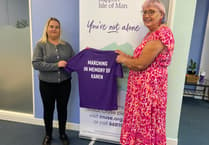RHIAN EVANS speaks to the Manx Wildlife Trust about misconceptions, sustainability and the charity’s plans for the future...
‘We’re not part of the Wildlife Park,’ Lucy Chapman - Team Wilder Co-ordinator at Manx Wildlife Trust - tells me when I ask her what some of the biggest misconceptions are about the charity. ‘We do collaborate with them though. The biggest misconception is that we’re part of government, we’re not. Our income is through donations, grants, and corporate sponsorship from collaborating with businesses.’
Collaborate is the key word here. Manx Wildlife Trust is an expert at collaborating with a multitude of people in the hopes of making the island a better place for everyone. The charity is supporting Media Isle of Man with Gef’s 30 Under 30 this year - an annual campaign celebrating the brilliant work being done by talented young people on the island - and is the official partner of the Collaboration Category.
‘We want to work with young people, so Gef’s 30 Under 30 is a good fit there, and the category Collaboration fits the way that we’re doing things right now really well,’ Head of Engagement at MWT, Graham Makepeace-Warne, tells me. ‘We can’t just focus on the habitats and the wildlife and expect things to work, we’ve got to collaborate with people. Just as our Biosphere status says the future of the Isle of Man thriving is really people and nature thriving together. That’s the ultimate collaboration.’
Sustainability is a huge part of the work being done by MWT, and something that can often provoke negative responses. Lucy, who did a Masters in Sustainability and Behaviour Change after her 4-year-old expressed concern about climate change, believes this attitude is starting to change.
‘We’re at a good tipping point’ she says. ‘I think people are waking up to the fact that this is an issue that needs a very widespread action and we’re in a position to help people and businesses make significant changes in becoming more sustainable.’
A lot of the negative reactions towards moves to make the island more sustainable come from one of two things: A lack of understanding of what the term means and/or a fear of how much it’s going to cost.
‘I think there’s a lot of fear around the cost of doing things in a wildlife friendly or sustainable way’ Graham tells me. ‘I think that could come from governments saying they’re going to pledge X amount of money to this cause, and people may think “well that’s a load of money that could be going to something else like the NHS” but for me, it’s completely the other way around. Conservation and sustainability feed into an economy. So, in terms of the NHS, things like green prescribing and people spending time in nature means they need the NHS less so that saves a huge amount of money. Moving towards a wellbeing economy as opposed to a money-based economy is where the future is and we’re really trying to dispel those myths that this path is really expensive. It’s not. It’s really sustainable both in terms of the planet and funding.’
Education is a huge priority for Manx Wildlife Trust, not just for the general public but for school children, and there are plans in place for an education officer to deliver a wildlife education session to every nine to 10-year-old in the Island.
‘We want all children to be entitled to positive wildlife experiences, so they have the knowledge and ability to care for our environment.’
That’s not the only big project the charity has in the pipeline. MWT has two large temperate rainforest projects happening, one of those is through a partnership with Aviva.
‘We [MWT] acquired a piece of land that’s going to be developed over the next 10 years. We’re going to be planting 35,000 trees and then our aim is to reintroduce appropriate livestock onto the land. It’d be an example of farming and conservation working together, often people think it’s either or, but it doesn’t have to be. Putting a public footpath in too means there will be an amenity value.’
This is called agroforestry and helps dispel another myth that by being more sustainable, you’re taking away from key aspects of island life.
‘There’s a misconception that Manx Wildlife Trust getting more land for nature means it’s going to be removed from food production, and that’s absolutely not the case. There’s a way to do it where everyone can succeed.’ Lucy tells me. ‘We’re collaborating with farmers, food production, government. Again, it’s all about collaboration.’
.jpeg?trim=0,210,0,100&width=752&height=501&crop=752:501)
-with-representatives-from-each-chosen-charity.jpeg?width=209&height=140&crop=209:145,smart&quality=75)

-and-Kevin-Kneen.jpeg?width=209&height=140&crop=209:145,smart&quality=75)
